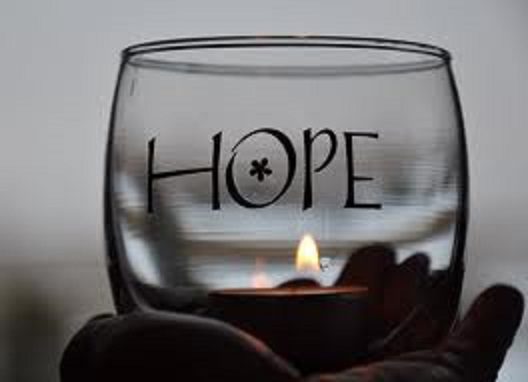“Now abide faith, hope, and love; but the greatest of these is love.” These words from the apostle Paul are heard at many, perhaps most, weddings. Everyone wants to believe that love is the greatest, especially on their wedding day. Faith seems to be part of my DNA—challenging it, trying to get rid of it, redefining it, being confused by it, and generally struggling with the “f-word” (as I call it in the classroom) has shaped me for as long as I can remember. I’m not so sure about hope.
Several years ago I asked Jeanne what she thought the opposite of faith is. She first answered “despair,” then immediately took it back saying “I guess despair’s the opposite of hope.” After a quick check on Google, I found that she was right (again). The immediate etymological root of “despair” is the Old French despoir: hopelessness. So what is hope?

Although Easter is certainly about love and faith, I think it is mostly about hope. There is no shortage of material to consider during the Easter season—the empty tomb, Peter and John racing to take a look, the authorities scrambling to explain what happened, the poignant exchange between Mary Magdalene and Jesus. Perhaps my favorite Easter-related story is today’s gospel–Luke’s account of two disciples on the road to Emmaus. It’s such a human story—the bitter sadness and devastation of Cleopas and his unnamed companion (call him Bob) is palpable.
The usual spin on the story is, of course, that Jesus is risen and walking with them, and Cleopas and Bob are either too dense or blinded by tears to know it’s him. Jesus gives them a free theology lesson, and as soon as they recognize him after he breaks the bread at lunch he vanishes. What a guy—the amazing, vanishing Jesus! It says something (I’m not sure what) about me that I always thought the ending of the story was funny when I was young. Young Baptist boys have to get their laughs where they can find them. But three words are particularly resonant: ![despair[1]](https://wp-media.patheos.com/blogs/sites/766/2013/03/despair1.jpg?w=300) “We had hoped that it was He who was going to redeem Israel.” We had hoped. And our hope was in vain.
“We had hoped that it was He who was going to redeem Israel.” We had hoped. And our hope was in vain.
Hope is a tough nut to crack—of the big three at the end of the passage in First Corinthians, love and faith strike me as easier to get a handle on. Every human life is marked by “we had hoped” moments that we never quite get over. I hoped that I would be concert pianist. Jeanne hoped she would marry someone who knows how to dance. But the dashed hopes of Cleopas and Bob are far more crushing. It’s easy to criticize Cleopas and Bob for failing to recognize that what they had hoped for was walking with them for seven miles, but that’s entirely fair.
True, Jesus does turn out to “redeem Israel,” and everybody else for that matter, but that’s not the redemption Cleopas, Bob and others were hoping for, a political redemption and establishment of an earthly kingdom by the Messiah. And it’s very telling that the Jesus-guided tour through the Old Testament touching on prophetic texts indicating that the Messiah would suffer and die doesn’t do anything for Cleopas and Bob. It’s not until the three of them have a meal, a human experience rather than a classroom experience, that they see it’s been Jesus all the time.
That is where the story usually ends, but it gets even more interesting. Cleopas and Bob run back to Jerusalem and report to the disciples what happened; in the middle of their story, the amazing, vanishing Jesus reappears! And another human, all too human moment—Cleopas, Bob, the eleven disciples, and everyone else are scared shitless. They think he’s a ghost. It’s not until Jesus lets them check out his body with its scars and eats a piece of fish in front of them that they realize it’s really him. The whole story is fraught with humor, fallibility, and humanity. Entertaining, yes; but what is God up to?
In her wonderful book Amazing Grace, Kathleen Norris asks “Does it ever surprise you that God chooses to be revealed in so fallible a fashion?” Well as a matter of fact, Kathleen, yes it does. All the time. Even when our greatest hopes are satisfied, it’s always in some sideways, back door, behind the scenes, fuzzy and oblique sort of way. And that can be frustrating. As I wandered through a very unsual Holy Week last week, it continually struck me that Jesus’ resurrection, the most spectacular and crucial event in human history, is surrounded by so many instances of mistaken identity, fumbling around, uncertainty, and missteps that it is truly comical.
But it makes perfect sense, and brings the central pillars of the Christian faith—the Incarnation, the Crucifixion and the Resurrection—together. The whole idea of incarnation, of God becoming human through and through, is outrageous and ludicrous at its core. What self-respecting creator of the universe would do it this way? Only one that loves what was created so much that becoming part of it, miraculously, is not only not a step down but is actually the only way to accomplish what has to be accomplished. We know that we are flawed, incomplete, jumbled and messed up creatures, so why should we be surprised that our hopes get addressed in that way?
The divinely infused cycle of death and resurrection is around us everywhere, in nature coming alive after a long winter, in church services populated by octogenarians and toddlers, in the annual arrival of new late teens ready to be taught on campus, just to name a few examples from my own daily life. It is not at all surprising that the resurrected Jesus, the hope of the world, was revealed in the midst of the daily and mundane rather than in power and glory. Kathleen once again: “In a religion based on a human incarnation of the divine, when ideology battles experience, it is fallible, ordinary experience that must win.”













